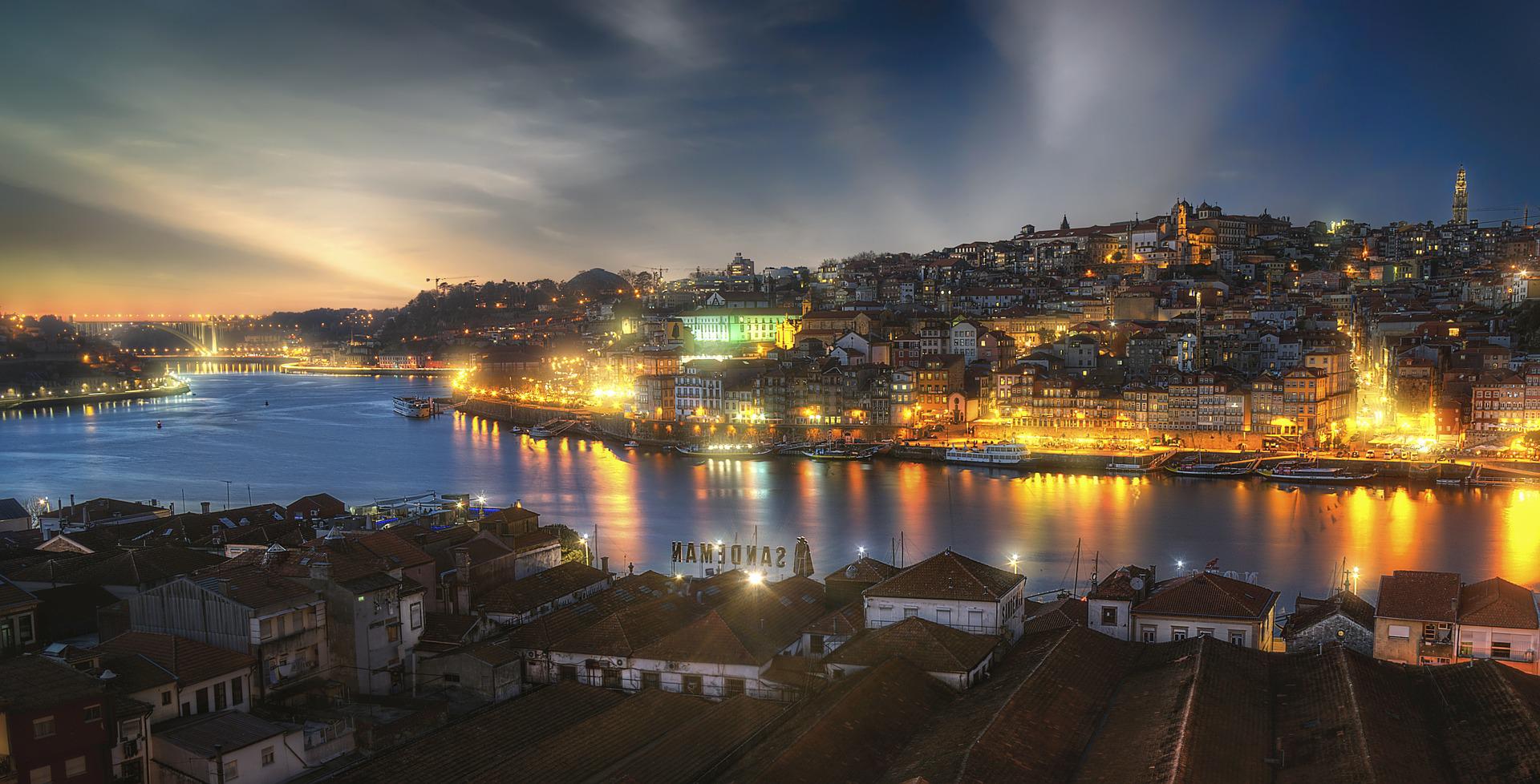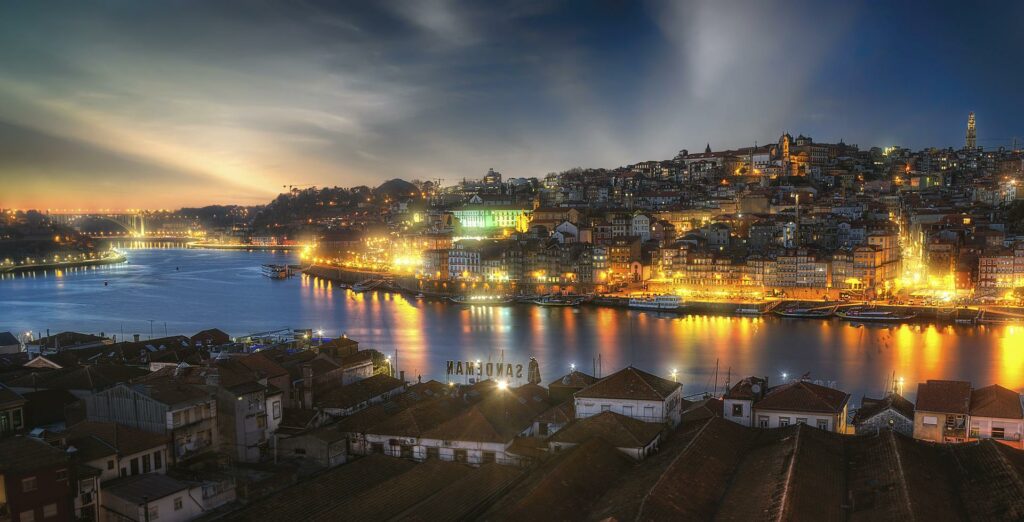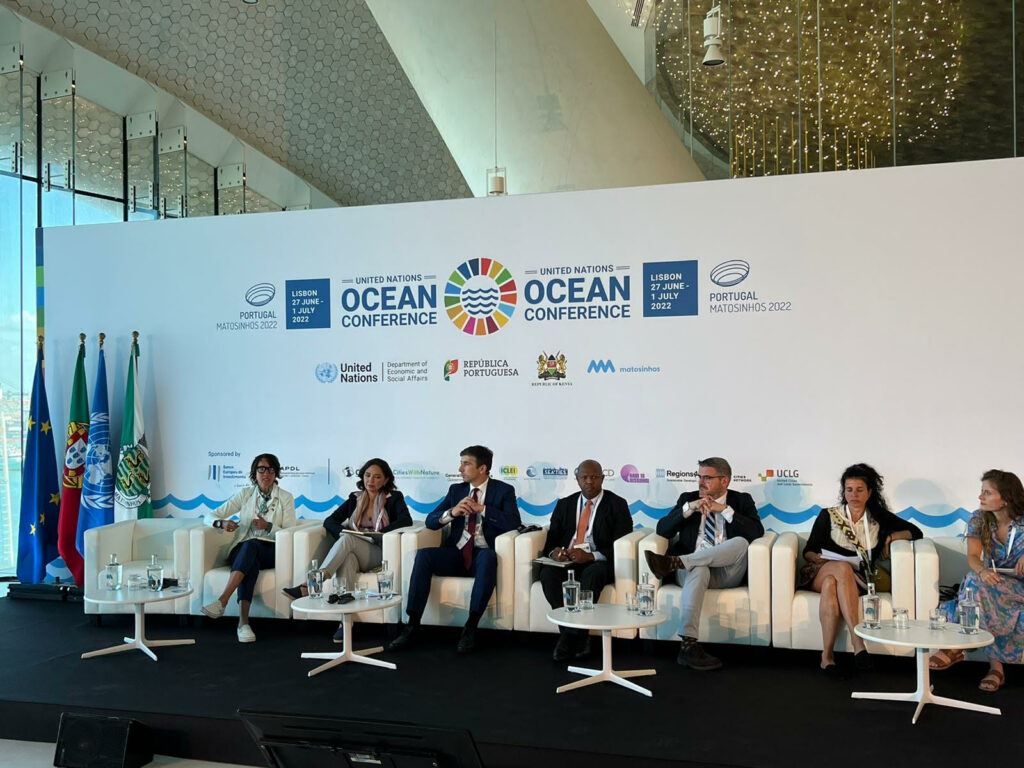20 July 2022
Our Ocean, Our Future, Our Responsibility – ICLEI at the UN Oceans Conference
Local and national leaders take charge to protect the world’s oceans. These are the stand-out sessions hosted by ICLEI




By 2025, nearly 6 billion people will live within 200km of a coastline. Population growth and climate change are increasing coastal risks and degrading coastal ecosystems upon which millions depend. Climate change impacts also compound existing pressures, such as pollution, ocean acidification and overfishing. Coastal cities and regions have unique opportunities to demonstrate leadership in protecting our ocean and ensuring our coasts are sustainably managed.
The UN Ocean Conference, co-hosted by the Governments of Kenya and Portugal, took place between 27 June and 1 July 2022 in Lisbon, Portugal, and culminated in delegates adopting a political declaration titled ‘Our Ocean, Our Future, Our Responsibility’.
The conference brought together national and local governments, UN agencies, and multiple stakeholders across different sectors to explore and identify solutions aimed at finding major structural transformations and common shared solutions, to be anchored in the SDGs.
Discussions focused on the interlinkages between Sustainable Development Goal 14 – Conserve and sustainably use the oceans, seas and marine resources for sustainable development – and other SDGs towards the implementation of the 2030 Agenda for Sustainable Development. Throughout the conference, the linkages between SDG 14 and goals related to clean water and sanitation, poverty, food security, health, women, decent work, climate action, cities, terrestrial ecosystems, and partnerships were emphasised.
Jessie Turner, Director of the International Alliance to Combat Ocean Acidification (OA Alliance) captured the importance of urgent action for oceans: “When talking about climate change impacts on our ocean, we must be clear that while we don’t know everything, we know enough to act. We know enough to begin prioritising and exploring the key questions that are most important to policy makers, seafood industries and coastal communities. And the good news is…we have lots of existing frameworks across different scales of governance that can be leveraged to take up this work.”
ICLEI – Local Governments for Sustainability and ICLEI’s Cities Biodiversity Center was represented by Kate Strachan – Manager, Climate Change Resilience, ICLEI Africa, and Stefania Romano – Global Coordinator for CitiesWithNature and RegionsWithNature, Recruitment and Advocacy.
During an interactive dialogue titled ‘Leveraging interlinkages between Sustainable Development Goal 14 and other Goals towards the implementation of the 2030 Agenda’, ICLEI emphasised the need for cities to learn from one another and apply these lessons and practices to protect, manage and restore vulnerable urban coastal ecosystems. To achieve this, CitiesWithNature and RegionsWithNature are international partnership initiatives providing a platform to connect local and subnational governments globally with NGOs, experts and communities to act for nature.
It has never been as urgent as it is today to restore damaged ecosystems,” Stefania said. “SDG 14 offers a great opportunity to advance ocean sustainability globally and address current and emerging threats.
ICLEI was involved in a number of sessions and played a role in bringing to the forefront the role of subnational governments in ocean governance. As evident during the conference, both national and subnational governments are leading the way, taking domestic and international actions that expand climate-ocean policy and financing for this work.
Organisations and partnership initiatives such as ICLEI, CitiesWithNature and RegionsWithNature can facilitate learning from coastal city leaders, while simultaneously seeking deeper integration across climate, ocean and biodiversity commitments. These efforts will advance actions that address climate change, support food security and sovereignty, and increase resilience of marine ecosystems, economies, and communities.
Despite the delays in pivotal ocean and climate convenings and benchmarks as a result of Covid-19 restrictions, the UN Oceans conference sparked momentum once again, through the notable outcome of the 2022 UN Oceans Conference – the ‘Our Ocean, Our Future, Our Responsibility’ declaration.

ICLEI as official partner to the UN Oceans Conference Special Event
Prior to the official Conference, a Special Event on ‘Localising Ocean Action’ was held in Matosinhos (Porto) and convened by the co-hosts of the 2022 UN Ocean Conference, together with the City of Matosinhos. The event was organised in collaboration with UN DESA, UN Global Compact, the UN Climate Change High-Level Champions, the Global Taskforce of Local and Regional Governments, ICLEI, Regions4 Sustainable Development, Ocean & Climate Platform (OCP), United Cities and Local Governments (UCLG), Resilient Cities Network, the International Association of Cities & Ports (AIVP) and OECD.
The special session highlighted urban-ocean linkages, specifically around marine plastic pollution, blue finance, local community development, human rights-based approaches towards transformation, and SDG 14 and the Post-2020 Global Biodiversity Framework. The special event also covered the role of local and regional governments to engage in global efforts and decisions to protect the ocean and maritime resources. The outcomes from the special event were conveyed during the main UN Ocean Conference.
ICLEI and the OCP co-organised Local Ocean Action Session 1, titled ‘The clock is ticking: How can coastal cities build resilience and incorporate nature-based solutions to protect local populations?’ This session focused on the importance of investing in innovative sustainable solutions, particularly nature-based ones, to combat the impacts of climate change, such as flooding, coastal erosion and rising sea levels. Speakers were invited to share innovative practices implemented by cities and regions. The panel was moderated by Kate Strachan, while Stefania Romano presented CitiesWithNature and RegionsWithNature as the Convention on Biological Diversity-recognised international partnership initiatives providing a platform and connecting local and subnational governments acting for nature. The side-event resulted in the Municipality of Matosinhos joining CitiesWithNature.
Session key messages:
- Coastal territories adaptation has to be considered at a larger territorial scale. From megalopolis to secondary cities and small towns, the more vulnerable urban areas have to collaborate at the regional scale to better design sustainable coastal adaptation strategies. It is crucial to reinforce cooperation at every level and encourage a “whole-of-society” approach.
- Climate coastal adaptation is changing towards a new sustainable paradigm. There is no one-fit-all solution. Managed retreat, nature-based solutions, hard and soft coastal protection, technical innovations, early warning systems, raising awareness, and education are all relevant responses that have to be combined, considering the local context.
- Key coastal stakeholders all have to be engaged in the global coastal transition for a sustainable blue economy, a well-adapted coastline and an equitable future. Local decision makers, populations, civil society, ports, tourism sector and privates should all be part of a co-construction process.
- Coastal adaptation and resilience have to include societal issues. Many communities have a difficult time securing funds and techniques for equitable coastal resilience. Targeting youth and women in terms of livelihood, coastal adaptation might be an opportunity to reduce poverty and social inequalities.
ICLEI in collaboration with Regions4, the Government of Catalonia, UCLG, and the Global Taskforce of Local and Regional Governments co-organised Session 3: ‘Strengthening Cooperation, Building Innovative Governance Approaches to Protect the Ocean’. Finding solutions to the complex and multi-dimensional sustainability challenges faced by coastal areas, which are aggravated by climate change, requires an inclusive and innovative governance approach. Building on the previous sessions that focused on impacts and finance, this session focused on governance as a core condition for the implementation of SDG14.
Session key messages:
- Local and regional governments have been leading in developing effective solutions through local public service provision, partnerships and initiatives that include and support fishers, and local populations and their know-how and experience must be harnessed to protect our oceans.
- Co-management approaches among different spheres of government and actors trigger a culture of collaboration and trust thus enabling an ecosystem-based management. These approaches can in turn permeate to other sectors.
- The achievement of sustainable small-scale fisheries calls for inclusive and participatory governance arrangements, at all levels. This entails meaningful participation, taking into account and addressing existing power imbalances, strengthening stakeholder organizations, such as small-scale fisheries organizations and supporting dialogue and peer learning.
- Close collaboration among actors must be backed by scientifically recognized data, all facilitated by impartial elements that ensure accountability and transparent, informed and fair processes.
- The capacity of local and regional governments in building sustainable management models needs to be strengthened. Particularly, the capacity of SIDS and their cities and regions to respond to global challenges in light of increased ocean and sea degradation.
- Local and regional governments are willing to join the decision-making table on biodiversity and ecosystem conservation, convening a powerful voice one the global agendas, while promoting opportunities for peer-learning, exchange of experiences and scale-up of effective practices.


